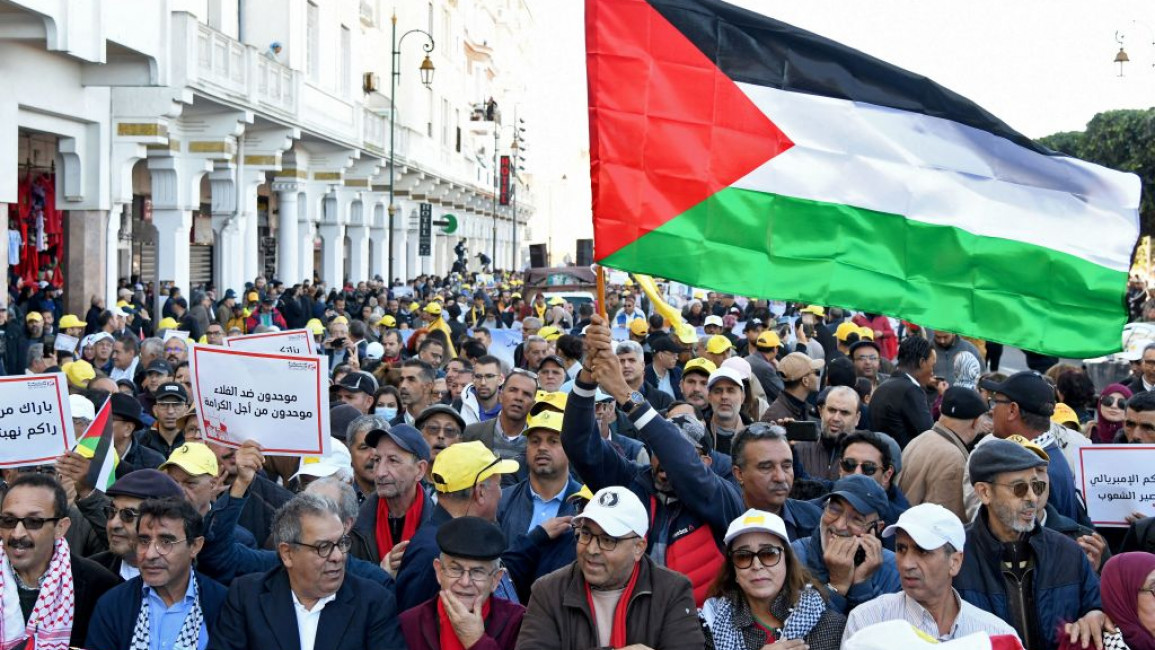Moroccans rally against 'the marriage of money and power'
A year after tycoon Aziz Akhannouch's election as Morocco's prime minister, Moroccans converged from across the country over the weekend to protest "the marriage of money and power" as the cost of living surged and arrests of anti-regime voices increased.
"We came to protest against a government that embodies the marriage of money and power," said Younes Ferachine, a coordinator from the Moroccan Social Front (FSM) group of political parties and left-wing trade unions that called for the march, in a speech ahead of the rally.
On Sunday, Moroccan protesters turned out in force in the capital Rabat, chanting in unison, "Struggle, O citizen, against the tyrants, against the oppressors" and "the people want to eliminate despotism and corruption."
From the parliament to Bab Lhed, Moroccan, Amazigh, and Palestinian flags flew side-by-side in the capital's sky as anti-government chants rocked the streets, echoing the February 2011 protests when Arab Spring's euphoria sizzled in Morocco.
Journalists estimated the number of protesters at 3,000 people, the largest rally in the last months. Police put the turnout at between 1,200 and 1,500 people.
Consumer price inflation was 7.1 per cent year-on-year in October, mainly due to surging food prices triggered partly by an intense drought that has hit farmers.
Hit by the economic impact of the Covid-19 pandemic and inflation, poverty levels are back to where they were in 2014, the government's High Commission for Planning said in a recent report.
Last year's election of the controversial businessman Aziz Akhannouch, the 13th wealthiest individual in Africa with an estimated net worth of US$2.2 billion, as the head of the Moroccan government has exacerbated the people-state conflict.
Several activists have accused Akhannouch, the owner of Afriquia Gas, the largest fuel company in the country, of personally benefiting from the fuel crisis. Akhannouch has yet to address the accusations.
"Morocco is not a poor country as the state claims, but rather possesses a huge wealth that Moroccans do not know its true size and where it is spent," argued Tayeb Modad, a member of the Moroccan Association for Human Rights, in a statement to The New Arab.
Pictures of jailed journalists Omar Radi and Soulaimane Raissouni were held at the rally, with activists calling for their immediate release.
Radi and Raissouni were prosecuted for sexual assault charges. Radi was also trialled for espionage. Amnesty International said the trials of the two state-critical journalists were "politically motivated".
Former human rights minister Mohammed Ziane, who was present in every protest in the capital over the last decade, was widely missed at Sunday's rally.
On 21 November, the 80-year-old lawyer was arrested from his office in the capital Rabat after the appeal court upheld an initial judgment of three years imprisonment against him over 11 charges, including "sexual assault", "contempt of court", "defamation," and "insulting and attacking the authorities and public officials".
Ziane, known as "the state's black sheep", was an outspoken critic of Moroccan public authorities and has defended many journalists taken to court in what human rights advocates have called trumped-up charges.
"I think human rights demands are related to social demands. (…) Among the goals pursued by the policy of silencing mouths is to intimidate citizens, so they remain silent and do not denounce corruption," Khaled Bekkari, a Moroccan activist, told TNA.


![President Pezeshkian has denounced Israel's attacks on Lebanon [Getty]](/sites/default/files/styles/image_684x385/public/2173482924.jpeg?h=a5f2f23a&itok=q3evVtko)



 Follow the Middle East's top stories in English at The New Arab on Google News
Follow the Middle East's top stories in English at The New Arab on Google News


